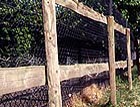Property advice: Squatter's Rights
Forgiving your trespassers might not be so easy if they win adverse possession, warns Roger Field


Exquisite houses, the beauty of Nature, and how to get the most from your life, straight to your inbox.
You are now subscribed
Your newsletter sign-up was successful
Most property owners will be aware that adverse possession presents both a risk and an opportunity. The old rule was that a person who had used another's land as if it was theirs, for a continuous period of 12 years, could apply to register the land as belonging to them. If disputed, the court considers such criteria as grazing animals without paying rent, putting up fences or maintaining the land, coupled with a failure by the owner to reject the trespasser's claim. This meant the law tended to be on the 'squatter's' side. The 2002 Land Registration Act the old rules still apply for unregistered land introduced a new regime. Someone claiming adverse possession, and who had not had 12 years of occupation by October 13, 2003, has to apply to the Land Registry after 10 years. The owner has 65 business days to object the notice will be sent to the address at the Land Registry, so keep it up to date. If the owner does lodge an objection, there are only a few statutory reasons why it will be overruled. The owner then has two years to start proceedings to evict the squatter. Fail to do so, and the squatter can reapply and chances are that the land will be lost second time round. If this area of law were not complicated enough, there is now a possible Human Rights Act dimension. Pye v Graham, in which the House of Lords reluctantly found for the squatter who had used fields worth £21 million rent free, has been appealed to Europe. If the European Court of Human Rights finds for the original owner, it will have major consequences for the concept of adverse possession. However, the conclusion is simple: land owners should not permit their land to be used without a formal, enforced agreement.
Exquisite houses, the beauty of Nature, and how to get the most from your life, straight to your inbox.
Country Life is unlike any other magazine: the only glossy weekly on the newsstand and the only magazine that has been guest-edited by His Majesty The King not once, but twice. It is a celebration of modern rural life and all its diverse joys and pleasures — that was first published in Queen Victoria's Diamond Jubilee year. Our eclectic mixture of witty and informative content — from the most up-to-date property news and commentary and a coveted glimpse inside some of the UK's best houses and gardens, to gardening, the arts and interior design, written by experts in their field — still cannot be found in print or online, anywhere else.
